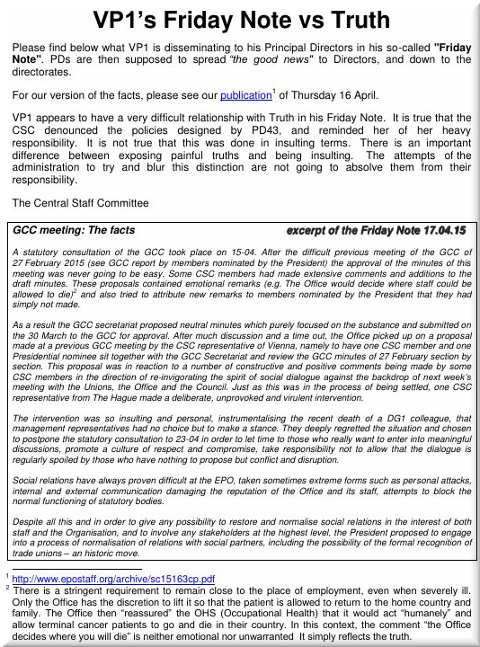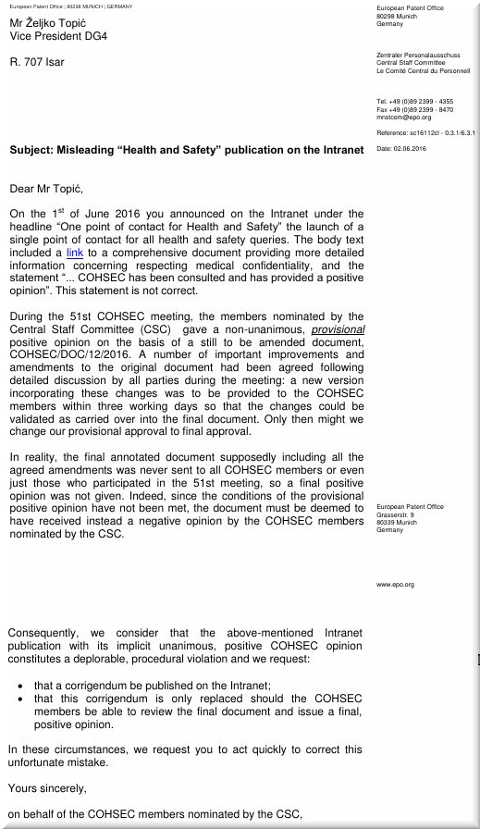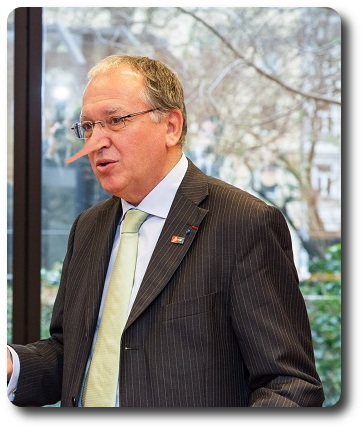08.25.16
Posted in America, Patents at 2:20 pm by Dr. Roy Schestowitz
A reminder of why the EPO‘s boards of appeal should be broadened, not squashed/scuttled/exiled

Summary: With help from the Patent Trial and Appeal Board (PTAB) — not just patent courts — software patents drop like flies by the thousands
TECHRIGHTS is gratified to see a decade of activism and long-sought reforms coming to fruition. A decade ago we could probably be called “crazy” for suggesting that software patents would one day be kaput even at the USPTO. But it’s actually happening and proponents of software patents are panicking (even writing “ALICE” in all CAPS or resorting to very old articles that are somehow supportive of their argument). No longer can they make a living by taxing software developers like yours truly and millions of people all around the world. Whatever one’s opinion might be on software patents, statistics show very clearly that the overwhelming majority of software developers reject them outright.
“Whatever one’s opinion might be on software patents, statistics show very clearly that the overwhelming majority of software developers reject them outright.”“Reading the Federal Circuit’s tea leaves on software patentability” is a new article whose summary introduces Alice: “In June 2014, the U.S. Supreme Court issued its Alice Corp. v. CLS Bank decision, finding that a computer-implemented, electronic escrow service was a non-patentable abstract idea.”
From the body of the article: “Until two years ago, software was generally patentable in the United States. Section 101 of the Patent Act governs what subject matter is patent eligible, excluding among other things abstract ideas from being patented.
“But in June 2014, the U.S. Supreme Court issued its Alice Corp. v. CLS Bank decision, finding that a computer-implemented, electronic escrow service was a non-patentable abstract idea. The Court held that that merely requiring “generic computer implementation” failed to transform an otherwise abstract idea into a patent-eligible invention.”
“We previously wrote about several Android applications that got axed (wiped off the face of the Earth) because of software patents.”Well, the Court of Appeals for the Federal Circuit (CAFC) has had to obey what the highest possible court said, even begrudgingly. That’s good for software developers, not necessarily FOSS developers but all developers in every country. “If you’re curious,” wrote a person on this new article about FOSS in Android, for lack of features “the reason is software patents.”
We previously wrote about several Android applications that got axed (wiped off the face of the Earth) because of software patents. Once they received a lawsuit threat, developers chose an immediate retreat. How does that promote/advance science and technology? It actually accomplishes the very opposite.
Deciding on matters like software patentability without even knowing how programming works and how computers work is outrageous, but it happens all the time. It has in fact become the norm. The following new article, which is behind a paywall, is titled “Patent Judges Should Be Scientists, Too” (Wall Street Journal). It says: “Patents are the lifeblood of biotechnology, the force that motivates companies to develop innovative medical treatments and bring them to market. The trouble is that these patents must be enforced in a court system that isn’t set up to adjudicate highly technical matters—resulting in rulings that seem arbitrary or even scientifically suspect.”
“They can discern or tell apart innovation from junk.”That is often true and applicable when it comes to copyrights in relation to code (see for example Oracle’s case against Google). At PTAB, by contrast, the chiefs are scientists, so no wonder they toss patents in the trash all the time. They can discern or tell apart innovation from junk.
MIP has a new article about PTAB’s chief judge Ruschke. Here is the part which is not behind a paywall:
In a call with reporters, the Patent Trial and Appeal Board chief judge said the number of judges now is enough, praised the impact of submitting expert declarations with preliminary responses, and said the Board was open to going beyond the 12-month statutory deadline for issuing final written decisions
David Ruschke, who took over as chief judge of the Patent Trial and Appeal Board (PTAB) in May, is satisfied with both the number of quality of judges he has at the Board. Ruschke previously managed the intellectual property portfolio of Medtronic’s CSH unit.
“The number of our judges that we have now at 270 is essentially where we are going to be at going forward,” he told reporters on a conference call. “That groups of judges is going to be providing I think a wonderful basis for the PTAB going forward.”
PTAB has been a leading enforcer of Alice (it’s a lot quicker than clueless, technology-illiterate courts) and patent lawyers hate it. They call it a “death squad”. Here is a patent lawyers’ advocacy site, IAM, saying what most recently happened at PTAB: “For the third time in as many post-grant reviews decided by the Patent Trial and Appeal Board (PTAB), the PTAB has declared a patent to be invalid based on the legal framework established in the 2014 Supreme Court decision in Alice Corporation Pty Ltd v CLS Bank International.”
Looking at another patent lawyers’ site, people are visibly upset at Alice. One of them wrote:
You must live in a different universe. The Supreme Court has been down right hostile to the CAFC.
One only has to read the fractured In re Alice decision (prior to the Supreme Court rewriting of law), to see what a mess the Supreme Court has made in its pursuit of power.
These are “captive patent courts,” Benjamin Henrion responded. Here is another comment:
The following link also supports the idea of tensions between the Supreme Court and Federal Circuit: http://www.abajournal.com/magazine/article/tug_of_war_over_interpretations_of_patent_law_continues_between_federal
They seem to be begging for some scandal that can somehow bring software patents back to life. Here is what Patently-O wrote about CAFC a few days ago: “Earlier this year, the Federal Circuit in a 2-1 panel decision in In re Queen’s University held there was a privilege over communications between a patent agent and client with respect to patent prosecution. That decision is here. I gave a talk earlier this year about how I think this case creates some risks even if it is followed, and the powerpoint for that talk is here.”
“In the above cases, the Federal Circuit does not deal with software patents, but when/if it does, then over 90% of the time it will throw them away.”PowerPoint is Microsoft lock-in, but in another new Patently-O post CAFC got mentioned in relation to OtterBox. To quote: “A substantial portion of the Federal Circuit’s appellate involve customs disputes stemming from the Court of International Trade (CIT). [...] In interpreting the statute, the Federal Circuit has taken the approach of construing HTSUS terms according to “common and commercial meanings, which we presume are the same.” Although not required by the statute, the court has also taken to relying upon the explanatory notes in the World Customs Organization tariff schedule to aid its interpretation. [...] In siding with OtterBox, the federal circuit stepped through Heading 4202 and found, inter alia, that the OtterBox cases would only fit as “similar containers,” but that they were not really similar. The important distinction is that OtterBox cases are designed so that the device is fully functional while in the case – that is not true for any of the cases listed in the heading.”
In the above cases, the Federal Circuit does not deal with software patents, but when/if it does, then over 90% of the time it will throw them away. This clearly bothers the software patents proponents, who as usual resort to BASCOM and Enfish (the few and rare exceptions]. Alluding to BASCOM and Section 101, Watchtroll writes somewhat of a rant. It starts innocently enough. “Last week the Patent Public Advisory Committee (PPAC) held its quarterly meeting at the United States Patent and Trademark Office (USPTO). These quarterly meetings give those on PPAC an opportunity to be brought up to speed about what is going on inside the USPTO, and to ask questions of various senior officials,” Watchtroll writes. But then, this Watchtroll who stoops very low in his attacks on PTAB ended up concluding with: “Could the Patent Office address this differently? Yes. Is the way Patent Office senior officials are addressing 101 in the guidance incorrect or outside of the envelope of reasonableness? No. Is the way examiners are applying 101 in keeping with the guidance? Absolutely not. Is this one big mess? You bet!”
“Software patents are a dying breed of patents.”So, doing the right thing is “one big mess”. Right…
The patent microcosm (mostly lawyers) just keeps lobbying the USPTO in order to make it their eternal vassal on matters such as patent scope. They just try to undermine Alice rather than accept the decision and move on. They even got Kappos in lobbying mode, utilising his connections (he is the former Director of the USPTO) to throw away Alice and attempt to restore software patenting. Another new example of this reluctance to accept the new formality can be seen in this tweet that says “Drafting claims: preambles? Dangerous. Just analyzed BASCOM: preamble may establish what a claim is “directed to” (abstract idea) for Alice.”
No matter how artful they try to be in interpreting Alice, the statistics speak for themselves, both at PTAB and at CAFC. Software patents are a dying breed of patents. Sooner or later, once challenged sufficiently, all ‘pure’ software patents turn out to be abstract. █
Permalink
 Send this to a friend
Send this to a friend
Posted in America, GNU/Linux, Google, Patents at 12:42 pm by Dr. Roy Schestowitz
Has the U.S. International Trade Commission finally become less trigged-happy when it comes to embargoes?

By Source (WP:NFCC#4), Fair use of copyrighted material in the context of Sound Blaster
Summary: Some good news from the U.S. International Trade Commission (ITC), which may have put an end to Creative’s new war on Android (using old patents)
OVER THE years we have not had much (or anything) good to say about the ITC. It seemed nationalistic and unreasonable. Based on allegation or suspicion alone it could suspend operations or businesses in the United States, especially when these were foreign (non-US).
Earlier this summer we wrote about Creative Technology, based in Singapore, going after Android OEMs with massive patent demands, having been ‘endorsed’ by Apple payments. Well, it turns out Apple should never have paid them in the first place. Their patents are junk.
“When once-famous brands like Creative and BlackBerry become nothing but a pile of patents there’s a lot of trouble for FOSS such as Android, which is built on top of Linux. ““First spotted by Law360,” an Apple advocacy site wrote, “Administrative Law Judge David Shaw of the U.S. Patent and Trade Office (USPTO) has ruled that Creative Technology’s patent that addresses music library navigation and sorting in the iPod, and now iOS overall, was too abstract to be eligible for a patent.”
It also said: “A patent that Creative Technologies used in the beginning of the century against the iPod forcing a $100 million payout by Apple has been invalidated, saving the rest of the smartphone industry from costly settlements and protracted legal battles.”
According to this, “Apple paid Creative a single license fee of $100 million to use Creative’s software interface patent,” which is certainly a lot of money, probably enough to convince Creative to prey on Android OEMs that can barely afford it (and might prefer to settle out of court). The original report said “U.S. International Trade Commission judge handed smartphone makers a win Friday, ruling that a media player patent that netted a Singapore software company a $100 million settlement with Apple is invalid under Alice, in what appears to be the first time an ITC investigation has been terminated during its early review program.”
This is great news and a huge relief to some Android OEMs. On the face of it, ITC made a determination on another case, as reported by MIP. “In a first for its 100-day pilot programme, the ITC has invalidated a patent involved in a $100m iPod-related settlement a decade ago. In a separate ruling, the commission has ruled that Fitbit did not misappropriate Jawbone’ trade secrets,” says the summary. We wrote a great deal about the latter case too. It’s now a two-way battle. They would both be better off just focusing on development, not bickering over patents. The latter case was also mentioned in corporate media this week (albeit very briefly). To quote CNBC: “A U.S. International Trade Commission ruled Fitbit did not steal rival Jawbone’s trade secrets. Jawbone accused Fitbit of infringing six patents and luring away employees to with confidential data about Jawbone’s business.”
The behaviour of Creative without a doubt was becoming a problem for Android and by extension a threat to Linux, so the former of the two aforementioned cases is important. BlackBerry’s transition into ‘patent troll’ was also mentioned here recently and it’s receiving unwanted media attention from a trolls expert. “BlackBerry’s new round of patent lawsuits targets BLU—and Android,” says the headline. Here is an except:
BlackBerry has filed three patent infringement lawsuits in as many weeks. The struggling phone company’s offensive barrage began with a case filed against IP telephony company Avaya on July 27. Last week, BlackBerry filed two lawsuits against budget cell phone maker BLU’s products, alleging that BLU infringes a whopping 15 patents.
The dual lawsuits against BLU suggest that BlackBerry’s new turn toward patent licensing isn’t going to be a one-off event, but rather a more extended campaign. In a May earnings call, BlackBerry CEO John Chen told investors he’s in a “patent licensing mode” and is hoping to monetize his company’s 38,000 patents.
The new lawsuits also suggest that BlackBerry has patents it believes describe Android features, so don’t be surprised if more Android phones are in the crosshairs soon. One of the two cases filed last week accuses user-interface features that are more about Android than they are about BLU. A small manufacturer like BLU could make for a good “test case” against a maker of Android phones.
When once-famous brands like Creative and BlackBerry become nothing but a pile of patents there’s a lot of trouble for FOSS such as Android, which is built on top of Linux. Software patents need to end and patent sanity assured. Customers only lose when products are intentionally made more primitive due to fear of litigation. A lot of them are incredibly overpriced, too. █
Permalink
 Send this to a friend
Send this to a friend
Posted in Asia, Bill Gates, IBM, Microsoft, Patents at 12:03 pm by Dr. Roy Schestowitz

Summary: A parade of misinformation as seen in Indian (but English-speaking) press this week as questions about patentability of software resurface
FOREIGN giants which operate in India (companies like IBM and Microsoft) just can’t help trying to repeatedly introduce software patents in India, aided by front groups and lawyers of theirs. Why on Earth is NASSCOM, which is connected to Bill Gates [1, 2, 3], participating in a debate in India regarding software patents or even just software? “NEW rules designed to boost India’s software industry will open for public consultation in a matter of days, say sources close to the matter,” said one new article among several this week (e.g. [1, 2). These mentioned software patents as well and some correctly noted that “this opens them [software companies] to patent trolls. Dealing with patent trolls here as India doesn’t have software patents.” The English here is problematic and then it says this: “So the conundrum for startups is whether to stay in India or not.”
“India is constantly being lobbied by big businesses that are not even Indian.”No, startups would be wasting their time pursuing patents on software. In practice, heavy-pocketed corporations from abroad want software patents. Indian startups do not. But don’t count on corporate media like the above to accurately represent the desires and needs of ordinary Indians. Neither should anyone trust NASSCOM, one among several Indian agencies that act like outposts and brought India nothing but EDGI.
India is constantly being lobbied by big businesses that are not even Indian. Watch what Microsoft has done to the Modi government earlier this year and last year. It shot down a Free/Open Source software policy. █
Permalink
 Send this to a friend
Send this to a friend
08.23.16
Posted in GNU/Linux, Google, Microsoft, Patents at 4:45 am by Dr. Roy Schestowitz
Another outrageous patent settlement that requires Microsoft bundling, but the Linux Foundation is too bribed by Microsoft to actually antagonise it any longer
“I’ve killed at least two Mac conferences. [...] by injecting Microsoft content into the conference, the conference got shut down. The guy who ran it said, why am I doing this?”
–Microsoft's chief evangelist
Summary: This morning’s reminder that Nadella is just another Ballmer (with a different face); Motorola and Lenovo surrender to Microsoft’s patent demands and will soon put Microsoft spyware/malware on their Linux-powered products to avert costly legal battles
MICROSOFT is not a friend. It’s a predator. It just changed the logo, the PR, and the CEO. It also started paying more and more money to its critics, including Linux OEMs, to keep them quiet. “Microsoft Keynoting LinuxCon,” said a headline from Phoronix yesterday. What it failed to say is that Microsoft actually pays the Linux Foundation to infiltrate it. This has gone on for a while. Earlier this month the Linux Foundation posted a Microsoft puff piece paid for by Microsoft. We mentioned it this worrisome development the other day (to their credit, the Linux Foundation did add a disclosure to this). The payment was made under the pretense of supporting a conference (i.e. interjecting Microsoft stuff into it).
Is Microsoft becoming more open? No, it’s spying more and more. All the core products are proprietary. What is PowerShell all about? Openwashing. “Embrace and extend” of wget and curl (soon to have Mono as well) while claiming to be “opening up” a part of Windows, which is proprietary spyware that defies law (and had Microsoft lose cases in court).
But never mind all the above. Has Microsoft actually made peace with GNU/Linux? Hardly. Au contraire. Microsoft is still attacking GNU/Linux. If “Microsoft loves Linux,” then it sure shows it like an abusive spouse that beats up the wife (to borrow the analogy from Simon Phipps). Microsoft extorts Linux again, but it has bamboozled the media like it first did when it attacked Acer. It did this several times more thereafter and we covered it earlier this year, e.g. in:
Remember what happened to Samsung when it said “No!”
Microsoft took it to court and Samsung later settled with bundling (early 2015). That’s like racketeering, but Microsoft is far too politically-connected to face charges under the RICO Act.
In the past, Microsoft was offering payments for bundling; right now, instead, it’s a patent settlement. A patent settlement over what? Linux. The media is calling it all sorts of things other than patent settlement (after threats), which is what it really is. Here is the coverage we see right now (misleading):
The following two articles suggest that Motorola too (already sued by Microsoft over patents) is a victim of this strategy:
All that Microsoft is trying to achieve here is control over Linux-powered mobile (or Android) users, e.g. using Skype malware. People who actually think that Microsoft has changed need to reassess their trust in corporate media (much of the above is Microsoft-connected media and Microsoft advocacy sites that help mislead other media). █
Permalink
 Send this to a friend
Send this to a friend
08.22.16
Posted in Deception, Europe, Patents at 8:48 am by Dr. Roy Schestowitz
“In a time of universal deceit, telling the truth is a revolutionary act”
“Truth is treason in the empire of lies” (attribution note)
Summary: Evidence serving to show that EPO Vice-Presidents are still intentionally misrepresenting EPO staff representatives and misleading everyone in order to defend Battistelli
THE previous post about Battistelli's lies would not be complete without showing that his loyal goons (those who have historically been like his lapdogs) also distort the facts and blatantly lie.
Here is a document regarding the above-the-law Vice-President:

Here is a document regarding the EPO Vice-President who faces many criminal charges (and arrogantly believes he is above the law, so he refuses to even attend court hearings he's summoned to attend):

The moral and ethical erosion at the EPO‘s top-level management isn’t too hard to see. It is sad if not depressing to see what was once a reputable institution. Witness what it has sunk to because of misguided and highly abusive men (yes, men) in suits. When even flagrant disregard for the truth has become so banal/mundane how are patent applicants expected to come to the EPO for (patent) justice?
Misleading publications that are published only in the Intranet or passed internally (personally) between managers are hard to get a hold of and we receive legal threats for publishing them. Without these, showing the rot inside the EPO is a lot harder (there are virtually no whistleblower protections in the land of Eponia, which serves to hide serious abuse). █
Permalink
 Send this to a friend
Send this to a friend
Posted in Deception, Europe, Patents at 8:12 am by Dr. Roy Schestowitz
Battistelli the politician (chronic liar) uses political tricks to give an impression of legitimacy

Source (original): Rospatent
Summary: Battistelli’s lies are coming under increased scrutiny inside and outside the European Patent Office (EPO), where patent quality has been abandoned in order to artificially elevate figures
CATCHING EPO officials in a lie has become far too easy. They’re lying to journalists, they’re lying to their own staff, and we have given plenty of examples of this. It would actually be an improvement if they stopped saying anything at all, following the “silence is gold” mantra.
“Battistelli lives in the fantasy land of the EPO (which he totally controls) and he really loves the IAM propaganda machine these days.”The EPO is going through an unprecedented crisis, but Battistelli lies about it to the media (even if insiders who are high officials acknowledge it). Dead (or at least dormant) EPO forums are one way for the EPO to distract from terrible internal affairs and PR people just keep pushing a Battistelli lobbying event that’s nearly a year away [1, 2], resorting even to borderline spam like seen in these couple of new examples [1, 2]. They have nothing positive to say, have they?
We recently saw information about Battistelli’s activities report, an oral report given with no citations, just a word of mouth. The information said this: “The President focussed as usual on the very good production (+14% in 2015 and an estimated +9% in 2016) and filing figures as well as claiming that quality had only improved as well: he cited a very positive survey in IAM magazine ranking EPO as the best patent office on quality in the world. He stated further that the social dialogue had intensified [...] He confirmed that a “Social Conference” looking into the conclusions from OHSRA, the social study and the financial study is now planned for 11 October, just ahead of the October Council meeting. He also referred to the reduction in sick-leave days, the success of the Inventor of the Year Award and progress on re-building The Hague.”
“It puts the EPO on un/ethical grounds similar to those of China.”Decline in EPO patent quality has been covered (even with supporting material) for quite some time in Techrights. Battistelli lives in the fantasy land of the EPO (which he totally controls) and he really loves the IAM propaganda machine these days. They produce ‘ammo’ for him. They’re like the think tank which he uses for lies about quality of patents. When does a so-called ‘news’ publication cross the line between journalism and propaganda mill? IAM is on holiday/break right now, but surely they know what to do next year in order to keep the money coming, even if some of it comes from the PR agency of the EPO.
Notice how the above-mentioned events are timed strategically; Timed to pressure the delegates without telling them the enormous cost of this publicity stunt. Some delegates, on the face of it, no longer take what Battistelli says at face value. The information continues as follows: “Unusually, only a few delegations made an intervention following this report. Even these few referred not only to the good filing and production figures, but also raised concerns over to the bad social atmosphere. Quality is becoming a new focus for many delegations: can it be realistically be maintained in the light of such increased productivity demands on DG1? It is not only the granted patent itself, but also the whole search and examination process which must be quality ensured.”
“This should be cause for alarm inside the EPO and outside the EPO.”DG1 is the President’s goon who said on national TV that the EPO would ignore a ruling from the highest court. It puts the EPO on un/ethical grounds similar to those of China. These are basically a bunch of liars and maybe they even believe their own lies. A lot of politicians tend to be like that and one must remember that Battistelli is still a politician. Watch what happened in France a month ago. SUEPO has produced this English translation of a letter in French [PDF], which we included below with highlights in yellow:
F R E N C H
R E P U B L I C
Mr. Jean-Yves Le Déaut
Deputy, President of the OPECST
National Assembly
126 Rue de l’Université – 75355 Paris 07 SP
Paris, 12 July 2016
Jean-Yves LECONTE
Senator representing
French citizens
established outside
France
Dear Deputy, Dear Jean-Yves,
In the capacity of President of OPCEST (Parliamentary Office of Scientific Evaluation and Assessment), you recently travelled to The Hague at the head of a delegation of French parliamentarians in order to visit the European Patent Office there and to meet its President Benoît Battistelli. On this occasion, in particular, you awarded him the “Medal of the National Assembly”.
I am surprised that you have not taken account of the political risks which this visit might incur at a time at which the management of the President is the object of virulent criticism, such as has been made known by us to Mr. Emmanuel Macron, the Minister with responsibility for relationships with this Office (see the two letters enclosed herewith). The most significant of these bears on the decision by the current Executive of the Office to give priority in the registration of patents to “major accounts” from the Anglo-Saxon world, which, while generating substantial income, in particular is also incurring long delays for a large number of French “start-up” companies and small and medium-sized businesses. This issue was raised in particular by Ms. Axelle Lemaire, Secretary of State for Digital Affairs, at a public event which she attended in June 2015 on the occasion of the award of the “European Innovator Prize” organized by the EPO.
As well as this, the present management of the staff is the source of a very great deal of social tension, the most evident signs of which are the suicides of five persons, the sanction procedures, even to the extent of dismissal, imposed against persons who should enjoy protection (staff union representatives), and massive and regular strike actions both at The Hague and in Munich.
The appended note will provide you with more exhaustive details of the reasons for which we have been prompted to request that the Ministers of the Economy, Industry, and Digital Affairs set about the mobilisation of our representatives on the Administrative Council of the EPO, in order for them to obtain, as rapidly as possible, a reorientation of the approach adopted by its President.
I am at your disposal to discuss the points raised in the note, and, in
anticipation of this, I remain
Yours faithfully
Copy:
- The Members of the Parliamentary Office of Scientific Evaluation and Assessment
Enclosures:
- My letter of 21 September 2015 to the Minister of the Economy, Industry, and Digital Affairs;
- My note of 24 November 2015 regarding the situation at the EPO;
- A letter signed jointly by my parliamentary colleagues of 21 April 2016, sent to the Minister of the Economy, Industry, and Digital Affairs.
The EPO has essentially been taken over by a political monster and unless it can detoxify itself some time in the very near future, there will be no turnaround and no recovery. Politicians are used to faking accomplishments in the short term (like CEOs during their terms) and they don’t have any concern about whatever happens once they leave Office. This should be cause for alarm inside the EPO and outside the EPO. █
Permalink
 Send this to a friend
Send this to a friend
Posted in America, Europe, Patents at 7:28 am by Dr. Roy Schestowitz
Also: Why the EPO rapidly becomes the greater culprit

Summary: The United States continues its gradual crackdown on software patents (which are viewed as abstract and thus unpatentable), whereas in Europe things are murkier than ever
THE US Patent Office (USPTO) begrudgingly comes to grips with the fact that software patents are a passing fad. If the Office continues to grant these and most of the time US courts deem these invalid, what will that say about the Office?
According to this, Alice has just had another belated casualty because “US Pat 5,841,115, Nutritional information system; Killed w/Alice by Google” (a software patent). Google is pursuing software patents on driving and there is growing concern that this “could raise risk of patent litigation” so Google should not be viewed as an innocent victim here. It is growingly part of the problem.
“…many software patents they helped clients get (past, not future) are worthless pieces of paper right now.”In other news, “Patent Claims to Weather Alerts Not Patent-Eligible Under Section 101,” says a pro-software patenting site. “This is an unsurprising result in the post-Alice world,” it concludes. “Claims to alerting functionality can face stiff headwinds when challenged under Section 101, especially when not supported by a specification, or better, claim language, calling out technical improvements.”
One of the most vocal proponents of software patents in Europe took note of it and Watchtroll, probably the most vocal proponent of software patents in the US, is trying to promote ‘cheating’ the system to patent software in spite of Alice. We have come to expect that from Watchtroll, who is stooping quite low these days. They must be nervous and they are panicking as many software patents they helped clients get (past, not future) are worthless pieces of paper right now. Even the Federal Circuit, which helped bring software patents to the US in the first place, has become exceedingly hostile towards them. Here is a new comment from IP Kat:
Anything by the Federal Circuit is of momentary import and cannot be considered “the driver seat.”
This is a direct offshoot of what the Supreme Court has been doing and can be seen to be why the Court refuses to draw any clear lines. They Court simply does not want to be left out of any discussion of eligibility, even as it is beyond the Court’s allocated powers to write law in this area.
So, you may think that you are “moving beyond,” but that is merely a mirage, as you have never left what the Supreme Court has done (is doing) – and that is by design of the Supreme Court.
Do you really think that such critical terms as “abstract” and “significantly more” are left undefined lacking a reason?
NOTHING that the Federal Circuit does is of lasting import in the realm of eligibility. And this is so because basically they lack the backbone to call a spade a spade and to note when the Supreme Court has stepped beyond the Court’s authority when it comes to the difference between interpreting the law and writing the law.
Much to our delight, things are improving in the US (patent scope improved/tightened), whereas in Europe we drift in the opposite direction.
“Much to our delight, things are improving in the US (patent scope improved/tightened), whereas in Europe we drift in the opposite direction.”“Laws in Brussels are written by MNCs (Multi-National-Corporations), and FRAND in DSM is part of it,” Benjamin Henrion wrote yesterday, linking to this upcoming talk titled “DSM, EIF, RED: Acronyms on the EU level and why they matter for software freedom” (some of these are used to sneakily bring software patents to Europe). From the abstract: “In the coming years, the EU is determined to bring its industries to the digital market and acquire a leading position on the global tech market. In order to achieve this ambitious goal of allowing Europe’s “own Google or Facebook” to emerge, the EU has come up with several political and legislative proposals that obviously cannot overlook software. Three or more magic letters combined in an acronym have, therefore, the power to either support innovation and fair competition, or drown the EU in its vendor lock-in completely. The terms “open standards”, “open platforms”, and Free Software are being used more and more often but does it mean that the EU is “opening” up for software freedom for real? My talk will explain how several current EU digital policies interact with Free Software, and each other, and what does it mean to software freedom in Europe.”
Well, FRAND brings software patents to Europe, in spite of them being illegal. Does Brussels even care? The same applies to the EPO under Battistelli’s regime. He certainly does not care about the EPC. He just ignores it. This is why increased focus on internal EPO affairs is worthwhile and the next couple of posts will contain new information about abuse at the top. █
Permalink
 Send this to a friend
Send this to a friend
Posted in Apple, Courtroom, GNU/Linux, Google, Patents, Samsung at 6:53 am by Dr. Roy Schestowitz
Rounded corners? Apple’s invention!

Summary: Apple’s insistence that designs should be patentable could prove to be collectively expensive, as patent trolls would then use a possible SCOTUS nod to launch litigation campaigns
TROLLS, or patent sharks, typically use software patents, but what if they also had design patents at their disposal?
Apple‘s war on Android, which manifested itself in a now-settled case against HTC and later in a long patent war against Samsung, may prove to be counterproductive now that Apple attracts patent trolls like VirnetX, to which it might be forced to pay billions of dollars. A pro-software patents site now says that “Apple will also be an even richer target for the new breed of design patent trolls” if it wins its case against Samsung/Android (over design patents). To quote this new article:
On October 11, 2016, the Supreme Court will hear Samsung’s appeal of the Federal Circuit’s affirmation of the jury’s damage award to Apple of Samsung’s “total profits” on sales of the infringing smartphones even though it had only infringed Apple’s design of the iPhone’s outer shell. In upholding the “total profits” award, the Federal Circuit determined that it was bound to uphold the jury’s award by the “explicit” and “clear” statutory language relating to design patent infringement damages.
[...]
The importance of the Supreme Court’s ultimate ruling here is underscored by the numerous amicus curiae briefs filed (27 at last count). With over 205 billion in cash reserves at last count, Apple certainly doesn’t “need” the full nine-figure damage award. And, given the far reaching implications of this case, Apple may live to regret its aggressive pursuit of “total profits” for design patent infringement by finding itself battling design patent holders seeking to recover Apple’s total device profits for infringement of even a minor design feature. Apple will also be an even richer target for the new breed of design patent trolls already surfacing based, at least in part, on Apple’s success in this case. Clearly it is time for Congress to step in and amend Section 289 to add apportionment language.
No wonder technology companies are overwhelmingly supportive of Samsung in this case — a high-profile case over design patents.
In other news, Vera Ranieri from the EFF has this new update about one of their high-profile cases against patent trolls. Ranieri writes:
There has been significant activity relating to cases and patent infringement claims made by Shipping & Transit, LLC, formerly known as ArrivalStar. Shipping & Transit, who we’ve written about on numerous occasions, is currently one of the most prolific patent trolls in the country. Lex Machina data indicates that, since January 1, 2016, Shipping & Transit has been named in almost 100 cases. This post provides an update on some of the most important developments in these cases.
In many Shipping & Transit cases, Shipping & Transit has alleged that retailers allowing their customers to track packages sent by USPS infringe various claims of patents owned by Shipping & Transit, despite previously suing (and settling with) USPS. EFF represents a company that Shipping & Transit accused of infringing four patents.
The above is a timely and good example. It demonstrates not just of the harms of patent trolls but also the harms of software patents, which in the large majority of cases rely on them. If Apple made design patents stronger, with affirmation from the Supreme Court (SCOTUS), the damage would be enormous.
Apple is on the wrong side of history. █
Permalink
 Send this to a friend
Send this to a friend
« Previous Page — « Previous entries « Previous Page · Next Page » Next entries » — Next Page »

























 Content is available under CC-BY-SA
Content is available under CC-BY-SA